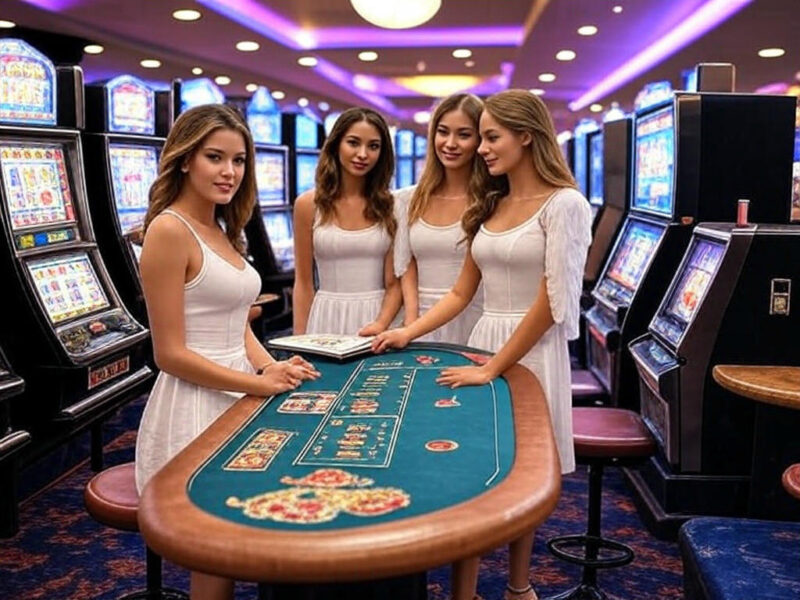As we step into the glitzy world of casino gaming, we are seduced by the flashing lights, the ringing of slot machines, and the thrill of the unknown. But beneath the surface glamour lies a complex web of psychology that drives our decisions and shapes our experiences in the casino. Join us as we peel back the curtain and uncover the intricate workings of the human mind in the high-stakes world of gambling.
Exploring the Intriguing World of Casino Gaming Psychology
Whether you’re a seasoned casino enthusiast or a casual player looking to try your luck, understanding the psychology behind casino gaming can provide valuable insights into the world of gambling. One key aspect of casino gaming psychology is the concept of intermittent reinforcement. This psychological principle suggests that our brains are more likely to repeat behaviors that are rewarded unpredictably. In the context of casino gaming, this means that the sporadic wins and near-misses keep players engaged and coming back for more.
Another fascinating aspect of casino gaming psychology is the influence of sensory cues on player behavior. Casinos are expertly designed to create a stimulating environment that appeals to all five senses. From the bright lights and jingling sounds of slot machines to the complimentary drinks and luxurious decor, every aspect of a casino is carefully crafted to keep players engaged and entertained. These sensory cues can trigger a release of dopamine in the brain, creating a pleasurable experience that reinforces continued play.
Furthermore, the concept of cognitive biases plays a significant role in shaping players’ decisions in a casino setting. Whether it’s the gambler’s fallacy, where players believe that past outcomes influence future results, or the hot-hand fallacy, where players believe that a winning streak will continue, cognitive biases can lead to irrational decision-making. By understanding these biases and how they influence behavior, players can make more informed choices when navigating the thrilling world of casino gaming.
The Influence of Environment on Player Behavior
One of the most intriguing aspects of casino gaming is how the environment can significantly influence player behavior. The sights, sounds, and overall atmosphere of a casino can play a crucial role in shaping the way players approach and engage with their favorite games. Research has shown that various elements within a casino setting can impact a player’s decision-making process and overall experience.
For example, the layout of a casino floor can have a profound effect on player behavior. From the placement of machines to the flow of traffic, casinos are designed to create a sense of excitement and anticipation. This careful arrangement can encourage players to stay longer, spend more money, and take greater risks. Additionally, factors such as lighting, colors, and even temperature can all influence how players perceive their surroundings and make decisions while gaming.
Furthermore, the social environment of a casino can also impact player behavior. The presence of other players, the interactions with dealers, and the overall vibe of the gaming floor can all contribute to a player’s mood and mindset. Whether it’s the thrill of competition or the camaraderie of shared victories, the social dynamics at play in a casino can greatly influence how players approach the games they love. Ultimately, the environment in which a player chooses to gamble can have a profound impact on their overall gaming experience.
Understanding the Role of Cognitive Biases in Decision Making
Cognitive biases play a significant role in decision making, especially in the context of casino gaming. These biases are psychological tendencies that can lead individuals to make irrational decisions based on subjective factors rather than objective reasoning. By understanding and recognizing these biases, players can better navigate the complexities of the casino environment and make more informed choices.
One common cognitive bias in casino gaming is the gambler’s fallacy, where players believe that past outcomes will influence future results, such as assuming that a roulette wheel is more likely to land on black after a series of red spins. This can lead to risky bets and financial losses. Another bias is the illusion of control, where players believe they have more control over the outcome of a game than they actually do, leading to overconfidence and poor decision-making.
When players are aware of these cognitive biases, they can take steps to mitigate their impact. By setting strict limits on their spending, avoiding emotional decision-making, and focusing on the statistical probabilities of games rather than subjective beliefs, players can increase their chances of making wise choices and ultimately enjoy a more positive gaming experience.
The Impact of Rewards and Reinforcement on Player Engagement
In the world of casino gaming, is a fascinating aspect that delves deep into the realm of psychology. Players are constantly seeking that rush of excitement and satisfaction that comes from winning a reward, whether it be in the form of bonus points, free spins, or cash prizes. This psychological phenomenon drives players to keep coming back for more, as they chase that elusive feeling of accomplishment and success.
The Psychology Behind Rewards and Reinforcement:
- Rewards trigger the brain’s pleasure center, releasing dopamine and creating a sense of happiness and satisfaction.
- Positive reinforcement reinforces desirable behaviors, encouraging players to continue engaging with the game.
- Variable reinforcement schedules, such as random rewards, are particularly effective in keeping players hooked and coming back for more.
Engaging Players Through Gamification:
By incorporating elements of gamification into casino games, such as leveling up, completing challenges, and unlocking achievements, operators can enhance player engagement and prolong their time spent on the platform. These additional layers of interactivity and progression tap into the player’s innate desire for achievement and advancement, keeping them motivated and entertained for longer periods.
Building Loyalty Through Personalized Rewards:
Personalized rewards cater to the individual preferences and playing habits of each player, creating a unique and tailored experience that keeps them invested in the game. By offering exclusive bonuses, special promotions, and personalized incentives, operators can cultivate a sense of loyalty and appreciation among their player base, fostering long-term relationships and repeat business.
| Player Benefits | Operator Gains |
|---|---|
| Increased motivation | Higher player retention |
| Enhanced player experience | Improved customer satisfaction |
| Greater sense of achievement | Boost in revenue |
Strategies to Maintain Responsible Gaming Practices
Understanding the psychology behind casino gaming is crucial in order to develop . One key aspect to consider is the concept of intermittent reinforcement, where players are rewarded at unpredictable intervals. This can lead to addictive behavior as players are constantly seeking that next big win.
Another important factor to consider is the impact of cognitive biases on decision-making while gambling. For example, the gambler’s fallacy, where individuals believe that past outcomes will influence future results, can lead to risky behavior such as chasing losses. By being aware of these biases, players can make more rational decisions and avoid falling into harmful patterns of behavior.
Implementing self-exclusion programs and setting limits on time and money spent at casinos are effective strategies to promote responsible gaming. Additionally, providing resources for individuals struggling with gambling addiction, such as helplines and support groups, can help prevent the negative consequences of excessive gambling.
Q&A
Q: What draws people to casino gaming?
A: The thrill of potentially winning big money and the excitement of taking risks are major draws for many casino gamers.
Q: Why do people sometimes become addicted to casino gaming?
A: The rush of dopamine in the brain from the possibility of winning can lead to addictive behavior in some individuals.
Q: How does the casino environment impact players psychologically?
A: The fast-paced, high-stakes environment of casinos can create a heightened emotional experience for players, leading to both positive and negative psychological effects.
Q: How do casinos use psychological tactics to keep players engaged?
A: Casinos often employ techniques such as colorful lights, sounds, and layouts to create a stimulating environment that encourages players to keep gambling.
Q: What are some strategies for responsible casino gaming?
A: Setting limits on time and money spent, taking breaks, and understanding the odds of games can all help prevent problematic gambling behavior.
Key Takeaways
As we have delved into the intricate world of casino gaming and the underlying psychology that drives player behaviors, it is clear that there is much more at play than mere chance and luck. Understanding the psychological principles at work can provide valuable insights for both players and casino operators alike. By shedding light on the hidden motives and cognitive biases that influence our decisions in the casino, we can arm ourselves with knowledge to navigate this exhilarating but often perilous realm with greater awareness and control. So the next time you find yourself at the gaming tables, remember that the real game may not be the cards or dice, but the mind itself. Happy gaming!


